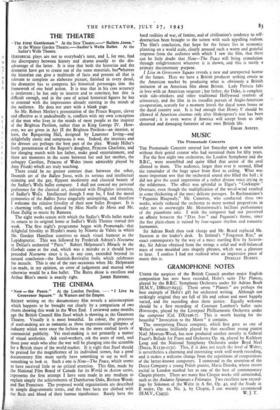THE THEATRE
The First Gentleman." At the New Theatre.—" Ballets Jooss." At the Winter Garden Theatre.—Sadler's Wells Ballet. At the Sadler's Wells Theatre.
HISTORICAL plays are not to everybody's taste, and I, for one, find the discrepancy between history and drama usually to the dis-
advantage of the latter. It is true that both the historian and the dramatist have got to create out of the same materials, butwhereas the historian can give a multitude of facts and present all that is relevant to complete an elaborate picture, finished in every detail, the dramatist has to compress his historical personages into the framework of one brief action. It is true that in his case accuracy is irrelevant ; he has only to interest and to convince, but this is difficult enough, and in the case of actual historical figures he has to contend with the impressions already existing in the minds of the audience. He does not start with a blank page.
So Mr. Robert Morley's presentation of the Prince Regent, clever and effective as it undoubtedly is, conflicts with my own 'conception of the man who lives in the minds of most people as the inspirer of the Brighton Pavilion, rather than as King George IV. How- ever, we are given in Act II the Brighton Pavilion—an interior, at least, the Banqueting Hall, designed by Laurence Irving—and delightfully exotic and sumptuous it was. Indeed, the interiors and the dresses are perhaps the best part of the play. Wendy Hiller's lively presentation of the Regent's daughter, Princess Charlotte, and her slanging match with her father, make good entertainment, and there are moments in the scene between her and her mother, the unhappy Caroline, Princess of Wales (most admirably played by Amy Frank) which are truly touching.
There could be no greater contrast than between the sober, Ibsenish art of the Ballets Jooss, with its serious and intellectual mimeing and the gay, flippant modernity and classical beauty of the Sadler's Wells ballet company. I shall not conceal my personal preference for the classical art, enlivened with Diaghilev invention, of Sadler's Wells. Intellectual though I may be, I find the moral gymnastics of the Ballets Jooss singularly uninspiring, and therefore I welcome the relative frivolity of their new ballet Bosquet. It is a charming trifle, well danced by Miss Noelle de Mosa and Mr. Hans Zullig to music by Rameau.
The eight weeks season with which the Sadler's Wells ballet marks its return to its original home at Sadler's Wells Theatre started this week. The first night's programme began with Promenacle,• that delightful frivolity to Haydn's music by Ninette de Valois in which Mr. Gordon Hamilton contrives so much visual humour as the Lepidopterist. This was followed by Frederick Ashton's Nocturne to Delius's orchestral "Paris." Robert Helpmann's Miracle in the Gorbals came at the end, which was a mistake as it should have preceded Nocturne since it is, in any case, extended beyond its natural conclusion--the Scottish-Revivalist frolic which celebrates the miracle. This is one of the rare occasions when Mr. Helpmann has made, in my opinion, an error of judgement and marred what otherwise would be a fine ballet. The Burra decor is excellent and Arthur Bliss's music is exactly right. JAMES REDFERN.


























 Previous page
Previous page